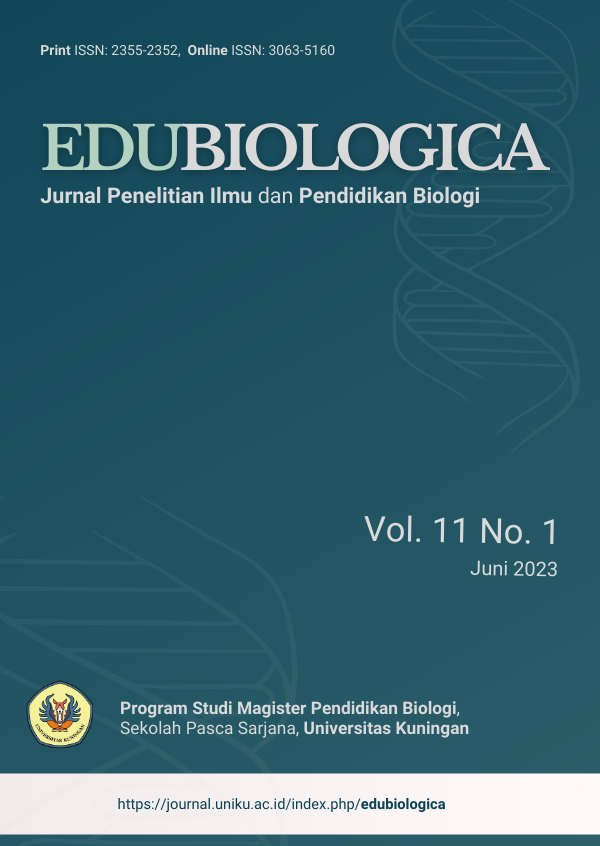Implementasi Project Based Learning untuk Meningkatkan Hasil Belajar Dan Kreativitas Siswa pada Materi Hidroponik di SMK Pejuang Negeri Hargeulis Indramayu
Abstract
The objectives of this research are (1) to implement Project Based Learning (PjBL) in improving students' learning outcomes and creativity on the topic of Hydroponics, (2) to determine the impact of PjBL implementation on improving students' learning outcomes, (3) to determine the impact of PjBL implementation on enhancing students' creativity, and (4) to determine students' responses to the Project Based Learning model in improving learning outcomes and creativity. The research method used a quantitative approach with a pretest-posttest control group design. The population in this study comprised all 11th-grade students of the Multimedia and Motorcycle Engineering programs at SMK Pejuang Negeri Haurgeulis Indramayu, consisting of 2 classes. The research sample was 32 students from the 11th-grade Multimedia program. The sample was determined by selecting one class as the experimental class using purposive sampling technique. Data collection techniques included observation, tests, and questionnaires. The analysis techniques used were descriptive and inferential statistics. The results of this study concluded that: (1) The implementation of learning using the PjBL model showed that teachers were able to carry out learning effectively, marked by the implementation of the PjBL model with an average percentage of 85%, where observer 1 had 10% unimplemented and observer 2 had 15% unimplemented. (2) The pre-test learning outcomes above the minimum passing grade (KKM) were 31.23%, while the post-test learning outcomes above the KKM were 87.5%. Thus, it can be concluded that there was a 56.25% increase from pre-test to post-test, which is categorized as moderate. (3) The use of the PjBL model in hydroponics projects was very positive for developing students' creativity, as reflected in the average creativity score of 82%, which is categorized as good. (4) The learning process of hydroponics projects using PjBL received positive responses from students, indicated by a percentage of 94.4%.References
Depdiknas, (2008). Kriteria dan Indikator Keberhasilan pembe laaran. Jakarta.
Hamzah B. Uno, dkk. (2011). Menjadi Peneliti PTK yang Profesional. Jakarta: Bumi Aksara.
Kemendikbud. (2013). Buku Implementasi Kurikulum 2013. Jakarta: Badan Pengembangan Kurikulum.
Liliasari, (2009). “The Development of generic science skillsof enhance students critical thinking ability”. Makalah diseminarkan pada joiny UiTM 2011. Bandung: UPI.
Munandar, Utami. (2010). Kreativitas dan Keberbakatan: Strategi Mewujudkan. Jakarta: Gramedia,
Permendikbud. (2014). Lampiran Permendikbud Nomor 103 tentang Pembelajaran pada Pendidikan Dasar dan Pendidikan Menengah. Jakarta: Kemendikbud.
Permendikbud. (2014). Lampiran Permendikbud Nomor 104 Tentang Penilaian Hasil Belajar Oleh Pendidik. Jakarta: Kemendikbud.
Slameto. (2010). Belajar dan Faktor -Faktor yang Mempengaruhinya. Jakarta : Rineka Cipta.
Sugiyono. (2010). Statistika untuk Penelitian. Bandung: Alfabeta.
Sugiyono. (2013). Metode Penelitian Pendidikan: Pendekatan Kuantatif, Kualitatif, dan R&D. Bandung: Alfabeta
Trianto. (2013). Model Pembelajaran Terpadu Konsep, Strategi dan Implementasinya dalam KTSP. Jakarta: PT. Bumi Aksar.
Toharudin, U. (2011). Membangun Literasi Sains Peserta Didik. Bandung: Humaniora
Wekesa, Noah Wafula , Ongunya, Raphael Odhiambo. (2016). Project Based Learning on Students’ Performance in the Concept of Classification of Organisms Among Secondary Schools in Kenya. Journal of Education and Practice. Vol 7 No. 16. Masinde Muliro University of Science and Technology. Kenya
Yalcin, S.A., Turgut, U., & Buyukkasap, E. (2009). The Effect of PjBL (Project Based Learning) on Science Undergraduates’ Learning of Electricity, Attitude towards Physics and Scientific Process Skills”. International Online Journal of Educational Sciences, 1 (1): 81-105.
Yunus, A. (2014). Desain Sistem Pembelajaran dalam Konteks Kurikulum 2013. Bandung: PT Refika Aditama.
Copyright (c) 2024 Edubiologica Jurnal Penelitian Ilmu dan Pendidikan Biologi

This work is licensed under a Creative Commons Attribution-NonCommercial-ShareAlike 4.0 International License.

1.png)
_(Custom).png)
.png)

